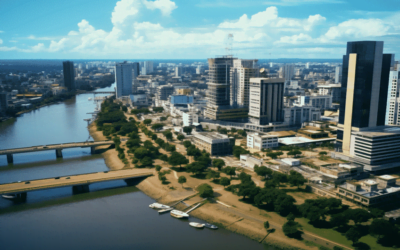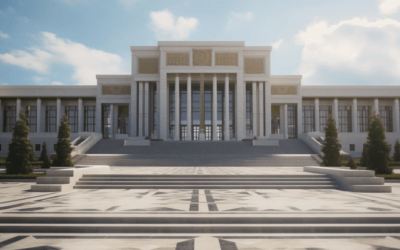You know that feeling when you’re all set to explore the skies with your drone in Nigeria, and suddenly, questions about the rules and regulations start buzzing in your mind? I’ve been there too. It can be confusing and a bit overwhelming.
But worry not; I’m here to help you navigate through the intricate world of “Nigeria Drone Laws.” Whether you’re a newbie or a seasoned drone enthusiast, understanding the rules is essential for a safe and enjoyable experience.
I’ve delved deep into the realm of Nigeria’s drone regulations, conducting extensive research to provide you with the most accurate and up-to-date information.
I’ve scoured the Nigeria Civil Aviation Authority (NCAA) guidelines, sought expert insights, and analyzed real-world experiences to ensure I have the answers you need.
So, if you’re looking for clarity on flying drones in Nigeria, you’re in the right place. Allow me to guide you through the rules and make your drone-flying adventure in Nigeria a breeze.
Ready to take flight into the world of Nigeria’s drone laws? You’re just a few scrolls away from gaining a comprehensive understanding of what it takes to fly drones in Nigeria legally and responsibly.
Stick around, because in the following sections, I’ll break down the rules for hobbyists, commercial operators, tourists, and even government agencies.
Whether you’re here to register your drone, learn about insurance requirements, or simply explore the do’s and don’ts, this article has got you covered. So, let’s dive in, and together, we’ll make your drone adventures in Nigeria soar high and stay hassle-free.
General Rules for Flying a Drone in Nigeria

So, let’s dive into the nitty-gritty of drone regulations in Nigeria—the ground rules for drone enthusiasts and operators alike. These rules form the backbone of drone safety and responsibility in our beautiful country. Strap in; it’s going to be a fascinating journey!
Explanation of the Fundamental Regulations
First and foremost, we’ve got to grasp the basics. In Nigeria, no matter how skilled you are at handling drones, there’s a protocol you’ve got to follow. It’s all about ensuring safe skies for everyone.
All drone operators, without exception, must seek the necessary authorizations before taking their drones to the skies. These authorizations mean the NCAA is aware of your flight plans and can help you stay within the law. It’s a simple step, but one that can make a world of difference in keeping your drone flights within legal boundaries.
Registering Your Drone
Drones come in all shapes and sizes, from feather-light to the more hefty ones. If your drone tips the scales at over 250 grams, which isn’t much in the drone world, it must be registered with the NCAA.
This rule helps keep tabs on the drones buzzing about in our airspace, a responsible move to ensure that everyone’s drone can be identified and operated legally.
Obtaining the RPAS Certificate
Now, this one’s vital. To fly your drone in Nigeria, you’ll need a Remotely Piloted Aircraft Systems (RPAS) certificate. It’s your official pass to the drone club, showing that you’ve got the knowledge and skills to pilot these marvels of technology safely. Whether you’re a rookie drone pilot or a seasoned pro, this certificate is your ticket to enjoying the skies legally.
Age Requirement for Drone Operators
Age is more than just a number in the drone world. To ensure responsible drone operation, the authorities have set an age requirement.
All drone operators must be at least 16 years old. This age restriction ensures that drone enthusiasts have the maturity and responsibility needed to operate drones safely and conscientiously.
Prohibition of Reckless Drone Operation
Here’s a no-brainer: Don’t fly your drone recklessly! Operating a drone in a manner that could endanger people, property, or other aircraft is strictly prohibited. The consequences of reckless drone operations can be severe, not to mention the potential harm it can cause. So, always keep safety front and center when piloting your drone in Nigeria.
Restrictions on Cross-Border and Over-the-Sea Flights
Flying drones is a thrill, but some boundaries can’t be crossed without proper authorization. You should never cross state borders without the green light.
Moreover, if you’re thinking about taking your drone over the high seas, remember to secure the necessary authorization from Air Traffic Control. Respect these limits, and you’ll keep your drone adventures on the right side of the law.
Also Read: Drone Regulation in Niger 2024
Categories of Drone Operators

Now, let’s talk about something crucial: the categories of drone operators in Nigeria. It’s not a one-size-fits-all world in the drone community, and understanding these categories will help you navigate the specific rules and requirements that apply to you.
Explanation of Different Categories
In Nigeria, we’ve got four main categories of drone operators, each with its own set of rules and regulations. First up, we have the hobbyists—those who fly drones for fun and leisure. Then, there are the commercial operators, the folks who use drones for business purposes, such as aerial photography, delivery services, and more. Tourists who want to capture Nigeria’s beauty from the sky also have their category, with specific guidelines. And, of course, there are the government agencies that use drones for various official operations.
These categories ensure that the rules are tailored to the specific needs and responsibilities of each group.
Whether you’re flying just for fun, using drones to boost your business, or you’re a tourist eager to capture breathtaking aerial views of Nigeria, there’s a category that fits your intentions, and the regulations make sure you fly safely and responsibly. Let’s dive deeper into each category to understand what’s required and how to ensure your drone flights comply with Nigerian laws.
Also Read: Drone Regulation in Nicaragua 2024
Hobbyist Drone Laws

Let’s get into the details of hobbyist drone laws in Nigeria. For those of us who love flying drones just for the sheer joy of it, there are some specific regulations to keep in mind. These rules are designed to ensure we can pursue our passion safely and responsibly while respecting the skies and everyone below.
License Requirement
If you’re a hobbyist, there’s good news—you don’t need a special pilot’s license to fly your drone in Nigeria. That’s a relief, right? You can take to the skies without the need for extensive training or certification. It makes drone flying accessible and enjoyable for enthusiasts who are in it for the thrill and the experience.
Drone Registration Criteria
Now, this is where it gets a bit more technical. If your drone weighs more than 250 grams or has a camera on board, it must be registered. This regulation ensures that even hobbyist drones that might have a bit more heft or recording capabilities are accounted for and can be identified. It’s a straightforward process, so don’t let it deter you from your drone adventures.
Recommendations for Remote ID and Insurance
While not mandatory for hobbyists, there are a couple of recommendations to consider. Remote ID is a handy feature that allows others to identify your drone in the sky, which can be especially useful if you’re flying in a group or near other drone enthusiasts.
And though insurance isn’t required, it’s a smart move to consider. Accidents can happen, and having insurance can offer peace of mind in case of unexpected mishaps during your drone flights. It’s always better to be safe than sorry.
So, as a hobbyist drone pilot in Nigeria, you’re free to soar into the skies without the need for a pilot’s license, but do keep an eye on the weight and camera equipment of your drone, and consider the added benefits of Remote ID and insurance for a worry-free flying experience.
Also Read: Drone Regulation in New Zealand 2024
Commercial Drone Laws

Now, let’s talk about the rules and regulations that apply to those of us who use drones for commercial purposes in Nigeria. Whether you’re capturing stunning aerial shots for a living or providing delivery services via drone, these regulations are essential for ensuring safe and responsible drone operations.
Commercial Drone Pilot License
If you’re using a drone for business purposes, you’ll need a Commercial Drone Pilot License. This license demonstrates that you have the necessary expertise and training to operate drones professionally.
It’s a crucial step in ensuring that commercial drone operations in Nigeria are carried out by skilled pilots who prioritize safety and efficiency.
Mandatory Drone Registration
Just like for hobbyists, there’s a requirement for drone registration, but it applies to all commercial drones. Registering your drone ensures it can be identified and traced back to its operator. It’s a straightforward process and part of the responsibility that comes with using drones for business purposes.
Insurance Requirements
When you’re using drones commercially, insurance becomes a necessity. Accidents or mishaps can occur, and having insurance is your safety net. It provides protection and peace of mind, ensuring that you’re financially covered in case of unexpected events during your drone operations.
Exemption from Remote ID
While hobbyist drone operators are encouraged to consider Remote ID, commercial drone operators are typically exempt from this requirement. This allows commercial operators more flexibility while conducting their business activities. However, it’s essential to stay updated with regulations as they may evolve over time.
So, if you’re using drones for business in Nigeria, make sure you’ve got that Commercial Drone Pilot License, register your drone, and don’t forget to consider insurance. These measures ensure you’re operating within the legal framework and promoting safety in the commercial drone industry.
Also Read: Drone Regulation in Netherlands 2024
Drone Laws for Visitors to Nigeria

Planning a visit to Nigeria and want to capture stunning aerial views with your drone? It’s an exciting prospect, but there are some important rules to keep in mind. Nigeria welcomes drone enthusiasts from around the world, but it’s crucial to understand the regulations that apply to tourists wishing to operate drones here.
Drone Pilot License for Tourists
If you’re a tourist visiting Nigeria and you plan to fly your drone, you’ll need a temporary drone pilot license. This license is specific to your stay in Nigeria and ensures you’re aware of the local regulations. It’s a responsible approach to drone operation, as it familiarizes you with the rules specific to the region.
Drone Registration or Authorization
Just like for local hobbyists and commercial operators, there are rules for drone registration or authorization. If your drone weighs more than 250 grams or has a camera, it should be registered or authorized for your stay. This process helps local authorities keep track of drone activity, ensuring a safer and more organized drone environment.
Recommendations for Remote ID and Insurance
While it’s not mandatory, as a tourist, you might want to consider Remote ID and insurance. Remote ID can be helpful, especially if you’re flying near other drone enthusiasts or in crowded areas.
Insurance, though not compulsory, is a wise choice to protect your equipment and provide peace of mind during your drone adventures in Nigeria.
So, as a tourist wanting to explore Nigeria from the skies, make sure to obtain a temporary drone pilot license, register or authorize your drone if needed, and consider the additional safety measures of Remote ID and insurance. These steps ensure you can enjoy the beauty of Nigeria from above while respecting local regulations and contributing to a responsible drone community.
Also Read: Drone Regulation in Nepal 2024
Government Drone Laws

Government agencies in Nigeria play a vital role in various operations, and drones have become valuable tools for their work. Let’s delve into the specific regulations that apply to government agencies operating drones in Nigeria.
Drone Pilot License
Government drone pilots are also required to hold a valid drone pilot license. This ensures that even government-operated drones are operated by trained and certified personnel who understand the rules and safety measures.
Drone Registration
Just like for other categories, drones used by government agencies must be registered. Registration helps maintain accountability and ensures that all drones, regardless of their purpose, can be identified and traced to their operators.
Exemption from Remote ID
Government drones are typically exempt from Remote ID requirements. This exemption offers government agencies more flexibility in their operations, allowing them to conduct missions without the need to broadcast identification information. It’s a measure that balances the unique needs of government drone operations.
No Insurance Requirement
Unlike commercial operators, government agencies are not required to carry insurance for their drones. While insurance can provide peace of mind in case of accidents, government agencies operate under different circumstances, and insurance is not compulsory for them.
So, for government agencies operating drones in Nigeria, the rules include holding a valid drone pilot license, registering the drones, and benefiting from an exemption from Remote ID requirements. While insurance is not mandatory, government agencies must adhere to other regulations to ensure the safe and responsible use of drones in their operations.
Also Read: Drone Regulation in Nauru 2024
When taking your drone to the skies in Nigeria, you need to keep it within a reasonable altitude. The rule is clear: fly at 400 feet or lower. This restriction ensures that drones stay well below manned aircraft, reducing the risk of collisions and promoting safer skies.
Safety Guidelines

Drone safety is paramount, not just for ourselves but for everyone in the airspace and on the ground. These safety guidelines are designed to ensure that every drone operator in Nigeria can enjoy their flights while maintaining a high standard of safety.
Altitude Restrictions (400 Feet or Less)
When taking your drone to the skies in Nigeria, you need to keep it within a reasonable altitude. The rule is clear: fly at 400 feet or lower. This restriction ensures that drones stay well below manned aircraft, reducing the risk of collisions and promoting safer skies.
Visual Line of Sight (VLOS) Requirements
It’s essential to keep a close eye on your drone while it’s in the air. Maintaining a visual line of sight (VLOS) with your drone is a crucial safety measure. This means you should always be able to see your drone, ensuring you have full control and can avoid obstacles and other aircraft.
Avoiding Flying Near Airports and Sensitive Areas
One of the most critical safety guidelines is to steer clear of airports and other sensitive areas. Flying near airports poses a significant risk to manned aircraft, which is something we all want to avoid. It’s essential to respect the no-fly zones around these areas and exercise responsible drone operation.
Prohibition of Flying Over Crowds, Stadiums, or Disaster Relief Efforts
Safety isn’t just about the skies; it’s also about the people on the ground. Never fly your drone over crowds, stadiums, or disaster relief efforts. Flying in these areas can put people at risk, disrupt events, and interfere with important emergency response operations.
No Drone Operation While Intoxicated
This one’s a no-brainer. Operating a drone while intoxicated is a recipe for disaster. Alcohol or other substances impair your judgment and reaction time, making it dangerous to pilot a drone. Always fly your drone with a clear mind and a sharp focus on safety.
Compliance with Airspace Requirements
Respecting airspace requirements is another key element of drone safety. Different airspace classifications come with their own rules and restrictions, so it’s crucial to familiarize yourself with the airspace where you plan to fly. Compliance with these requirements ensures that you operate within the law and maintain safety in the skies.
By following these safety guidelines, you not only protect yourself and your drone but also contribute to safer skies for everyone. Safety is a shared responsibility in the world of drones, and it’s a responsibility we should all take seriously.
Also Read: Drone Regulation in Namibia 2024
Enforcement and Penalties

Adhering to drone laws in Nigeria is not just a legal obligation; it’s also about ensuring the safety of everyone in the airspace and on the ground. Let’s take a moment to understand the significance of following these laws and the potential penalties for violations.
Importance of Adhering to Drone Laws in Nigeria
Drone laws are in place for a reason: to prevent accidents, protect privacy, and ensure responsible drone operation. Adhering to these laws is crucial for the safety of people, property, and the integrity of the airspace. It’s also about preserving the freedom to enjoy drone activities without compromising the well-being of others.
Potential Penalties for Violating These Laws
Now, let’s talk about the not-so-pleasant part. Violating drone laws can have serious consequences. Penalties may include fines and even imprisonment.
These consequences are not meant to discourage drone enthusiasts but to serve as a reminder of the responsibility that comes with operating drones. It’s in our best interest to operate drones safely and within the boundaries of the law.
So, remember, respecting drone laws in Nigeria is not just about avoiding legal trouble; it’s about ensuring the safety and enjoyment of all who share the skies and the land below. Let’s fly responsibly, respect the rules, and contribute to a vibrant and safe drone community.
Also Read: Drone Regulation in Myanmar 2024
Final Thoughts on Nigeria Drone Laws

As we wrap up this journey through Nigeria’s drone laws, it’s essential to reflect on the significance of these regulations and the responsibility that comes with operating drones in this beautiful country.
Nigeria’s drone laws are not just a set of rules but a framework that ensures the responsible and safe use of drones. They protect the privacy and safety of individuals on the ground, as well as the integrity of the airspace. These laws are the foundation for a thriving and secure drone community in Nigeria.
Whether you’re a hobbyist capturing breathtaking aerial images, a commercial operator providing essential services, a tourist exploring the scenic wonders of Nigeria, or a government agency contributing to various missions, I encourage you to be aware of and adhere to the regulations.
By doing so, you not only respect the law but also uphold the principles of safety, responsibility, and respect for others.
Let’s make the skies of Nigeria a place where drones can soar freely, capturing stunning vistas and contributing to various endeavors, all while respecting the rules that ensure the well-being of everyone.
As drone enthusiasts, we have the power to promote responsible drone use and create a thriving community that respects both the law and one another. Fly safely, Nigeria.
Frequently Asked Questions About Nigeria Drone Laws
1. Can I fly a drone in Nigeria without a license?
In Nigeria, it is unlawful to operate a drone without first seeking the required authorizations. Before conducting any drone flight within Nigeria, you must submit a flight plan to the Nigeria Civil Aviation Authority (NCAA) for authorization. Additionally, all drone operators must obtain a Remotely Piloted Aircraft Systems Certificate, ensuring they have the necessary training and certification to operate a drone legally in the country.
2. Do I need to register my drone in Nigeria, and what are the weight restrictions for registration?
Yes, drones weighing more than 250 grams (.55 pounds) must be registered with the NCAA. This registration requirement applies to all drone operators, whether they are hobbyists, commercial operators, tourists, or government agencies. Ensuring that your drone is registered is a critical step in complying with Nigeria’s drone laws and contributing to a responsible drone community.
3. What are the age requirements for operating a drone in Nigeria?
All drone operators in Nigeria must be at least 16 years of age or older. This age requirement is in place to ensure that operators have a certain level of maturity and responsibility when piloting drones in the country. It’s essential for maintaining safety and responsible drone use.
4. Can foreign visitors operate drones in Nigeria, and what are the regulations for them?
Yes, foreign visitors can operate drones in Nigeria, but they must obtain a “Recognition of Ownership” that must accompany them on all drone flights. Additionally, tourists are required to register their drones upon arrival in Nigeria, ensuring that authorities can monitor drone activity during their stay. While drone insurance is not mandatory, it is recommended for tourist drone operations to protect their equipment.
5. What are the consequences of reckless drone operations in Nigeria?
Drones in Nigeria may not be operated recklessly or in any other manner that could endanger people, property, or other aircraft. Reckless drone operations can have serious consequences, including potential penalties such as fines and imprisonment. It’s essential to operate drones responsibly and within the boundaries of the law to ensure safety and compliance with Nigeria’s drone regulations.













